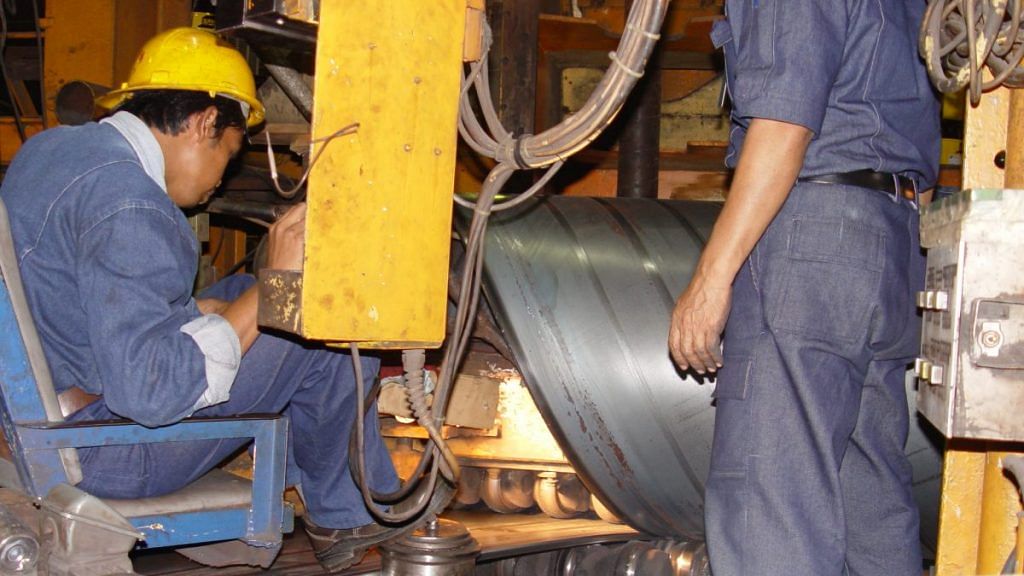New Delhi: The mechanical engineering course in Indias engineering colleges is set to get a 21st-century makeover, with 3D printing, drone manufacturing and more Information Technology (IT) subjects set to become part of the curriculum.
The All India Council for Technical Education (AICTE), the regulatory body to which all engineering colleges, barring centrally-funded technical institutes like IITs, IIITs and NITs, are affiliated, is undertaking a major revision to make the course more technology-centric. Once approved, it will offer the course to students from the 2022 academic session, ThePrint has learnt.
Two other branches of engineering — computer science, and electronics and communications — are also undergoing a routine curriculum revision.
The idea is to make the subjects more job-oriented for engineering students in the face of rapid changes in technology, economy and society, sources aware of the developments told ThePrint.
Mechanical engineering graduates are either losing their jobs to automation in the manufacturing industry or opting to work in a different branch like computers or electronics, and hence, a curriculum update was essential, the sources added.
Confirming the development, AICTE chairman Anil Sahasrabudhe said the council had received feedback about the mechanical engineering curriculum being outdated and in need of updating and hence a committee was appointed to revise it. “The committee has almost finalised its report, and as soon as it is approved, we will make it a part of AICTE-affiliated colleges and it can be offered from the next academic year,” he told ThePrint.
Sahasrabudhe added that the revisions happen every four years. The committees working on curriculum revision consist of academics and professors from IITs, NITs, technical universities and industry representatives.
Also read: MHA allows colleges to hold final-year exams, UGC wants exams to be wrapped up by September
‘Mechanical degree to be ITfied’
According to Prof. B Ravi, an IIT Bombay faculty member who heads the mechanical engineering curriculum committee, the aim is to “ITfy” the course and “make it more attractive to the brightest of students”.
“Topics such as computer-aided design and manufacturing, simulation and mechatronics will be strengthened in the revised curriculum,” he told ThePrint. “New interdisciplinary topics like 3D printing and drones, which combine design, materials, electronics and software will be introduced.”
The committee studied the current and emerging job prospects for mechanical engineering graduates, Ravi added.
“We are trying to create a flexible yet balanced curriculum with courses in science, technology, engineering and practice (STEP). This will enable students to plan their careers based on their aptitude,” the professor said. “They can seek traditional jobs in the manufacturing sector, or pursue research in laboratories, or incubate technology startup companies. The young generation is also rapidly embracing ‘Learn-Earn-Burn-Repeat’ philosophy and taking up ‘gig-work’ — working from home or vacation spots.”
Talking about mechanical engineering graduates losing their jobs to automation, a source associated with the committee explained, “For example, graduates would get jobs in the automobile industry in companies where manufacturing is required, but a lot of these companies are now going for automation and whatever manual work is left can be done by a diploma holder or someone with an ITI qualification as well. Companies do not need an engineer to do that job. Hence, it’s essential that mechanical engineers are equipped with new-age skills.”
Fewer students opting for mechanical engineering
The AICTE had also received feedback that fewer students are joining the mechanical engineering branch these days, and hence, one of the reasons behind revising the curriculum is also to make it more attractive to aspiring engineers.
While working on the revised curriculum, the committee kept in mind that it has to be valid for a majority of engineering colleges in the country, and should address the rapidly changing scenario in the industry, be valid for new jobs, and give more flexibility to students in terms of choosing subjects, sources said.
The ‘mechanical engineering temper’ implies the right knowledge, skillset, mindset and lifelong learning ability. This can be achieved by promoting experiential learning via hands-on (‘do-it-yourself’) experience, laboratories and team projects, sources added.
Other members of the committee include Prof. P.V.M. Rao from IIT Delhi, Prof. G.K. Ananthasuresh from IISc Bangalore, Dr Nagahanumaiah from CMTI Bangalore, Dr Bajirao Gawali from Walchandnagar College of Engineering, Sangli, and Dr. U Chandrasekhar from Wipro3D.
(Edited by Arun Prashanth)
Also read: NCERT textbooks to turn smarter with QR codes, syllabus set to be revised
